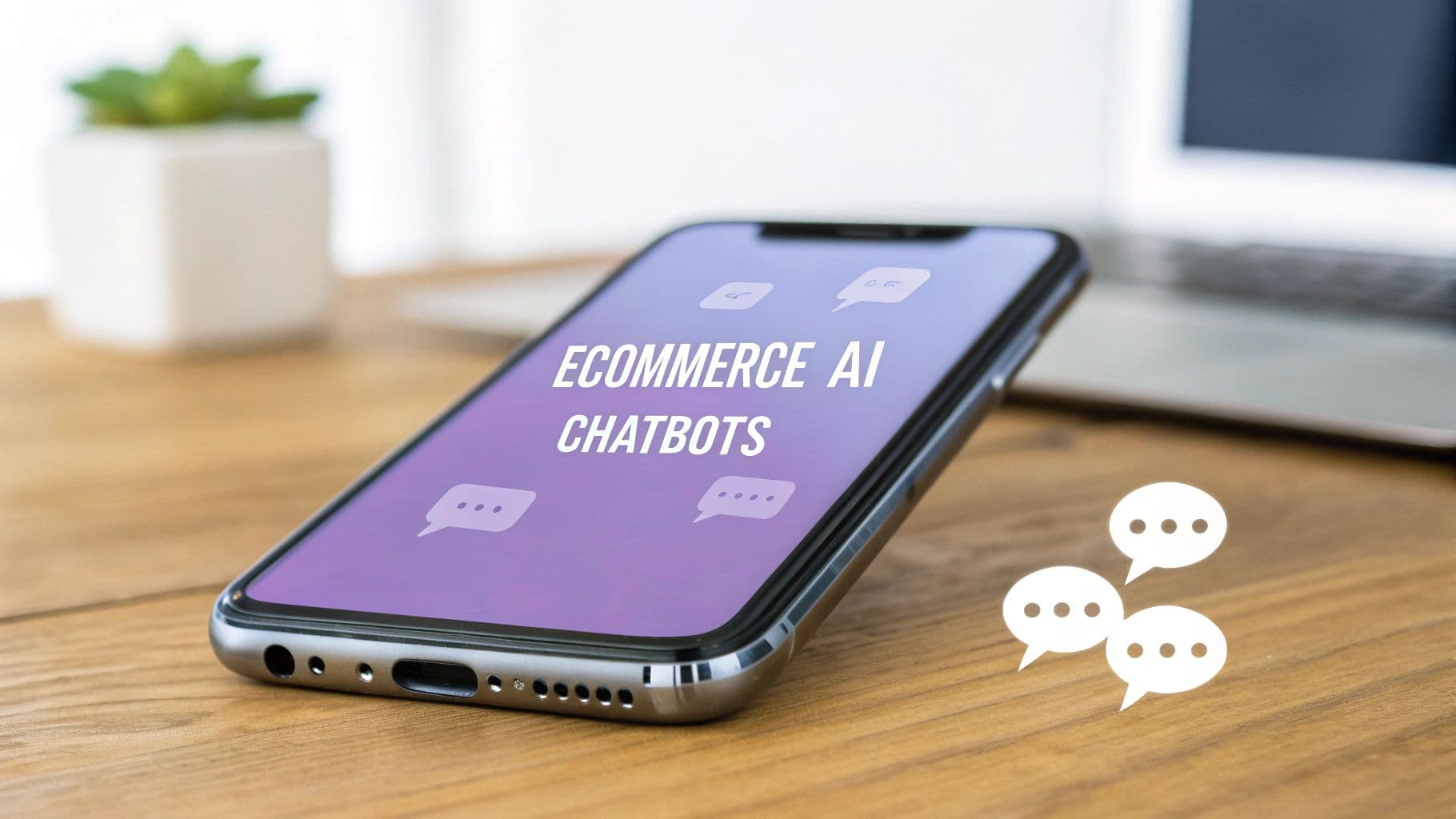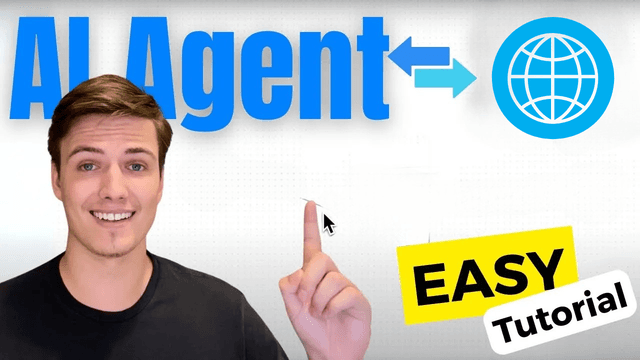Elevate Your E-commerce with AI Chatbots
Want to provide 24/7 customer support, boost sales, and streamline your e-commerce operations? AI chatbots are the solution. This article lists eight top AI chatbot for ecommerce platforms—FlowGent AI, WhatsApp Business AI, Tidio, Intercom, Drift, Zendesk Chat, ManyChat, ChatBot.com, and Ada—to help you improve customer experience, automate responses to common questions, and ultimately drive revenue in 2025. Dive in and discover the perfect AI chatbot for your business needs.
1. FlowGent AI
FlowGent AI is a powerful no-code platform designed to help e-commerce businesses enhance their customer support and engagement through intelligent AI chatbots. It offers a streamlined approach to deploying these chatbots across various communication channels, creating a seamless and efficient customer experience. This makes FlowGent AI a particularly attractive solution for businesses looking to scale their operations without significantly increasing customer support overhead. This platform stands out for its omnichannel approach, multilingual support, and seamless integration with existing business tools. For e-commerce businesses, it offers a comprehensive solution to automate routine tasks, personalize interactions, and ultimately drive sales and improve customer retention. It allows businesses to deliver fast, consistent, and personalized support around the clock, leading to improved customer satisfaction and increased sales opportunities.
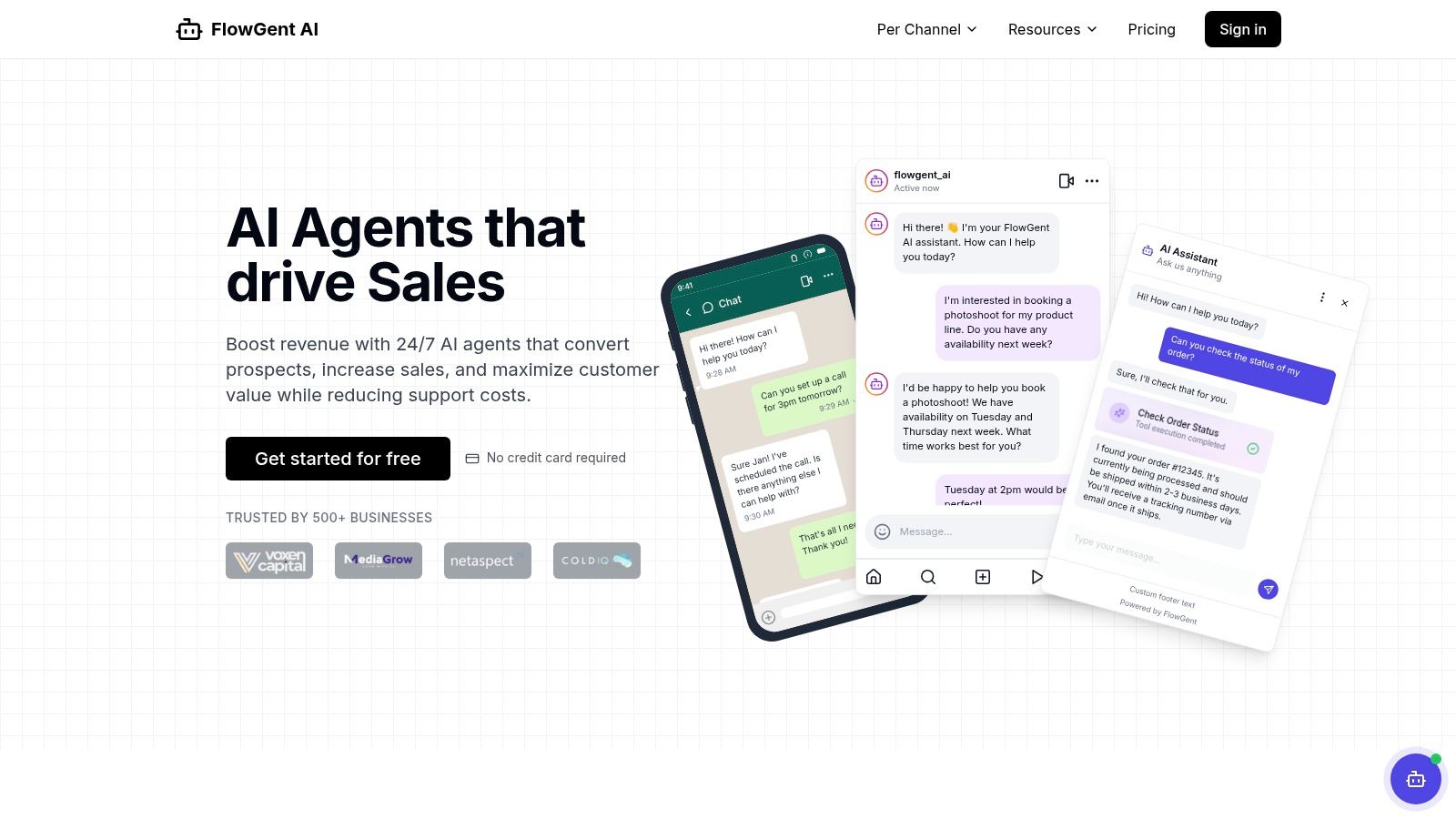
One of FlowGent AI's key strengths is its omnichannel deployment capability. It supports a wide range of platforms including WhatsApp, Slack, Instagram DM, website chat, and more. This ensures comprehensive customer coverage, allowing businesses to meet customers where they are and provide consistent support across all touchpoints. Imagine a customer initiating a conversation on Instagram and seamlessly transitioning to website chat without losing any context – FlowGent AI makes this possible. This streamlined communication significantly enhances the customer experience and promotes brand loyalty.
For e-commerce businesses dealing with international customers, FlowGent AI’s support for over 95 languages with automatic detection is a game-changer. This feature eliminates language barriers and allows businesses to expand their reach globally without needing multilingual support staff. This multilingual capability not only broadens your potential customer base but also enhances the customer experience by providing support in their native language.
FlowGent AI’s no-code platform makes it incredibly easy to set up and customize AI agents, even without technical expertise. The intuitive interface allows users to build complex conversational flows, define agent personalities, and integrate with existing systems with minimal effort. This ease of use allows businesses to quickly deploy and refine their AI chatbots, saving valuable time and resources. While highly customized setups might require some initial exploration for advanced configurations, the overall platform is designed for accessibility.
Integration is another area where FlowGent AI shines. It seamlessly connects with popular CRM systems, ticketing platforms, and order management software, ensuring smooth data flow and context retention across all customer interactions. This integration enables AI agents to access customer data, order history, and other relevant information, allowing them to provide personalized and efficient support. For example, the chatbot can access a customer's previous order history and provide accurate shipping updates or address specific product inquiries. This level of integration automates workflows and reduces manual data entry, freeing up human agents to focus on more complex issues.
FlowGent AI also excels in providing measurable results. The platform boasts impressive ROI statistics, including up to a 70% reduction in customer support costs, a 35% increase in qualified leads, and a 40% boost in customer retention. These figures demonstrate the platform's effectiveness in automating support, qualifying leads, and fostering customer loyalty.
While FlowGent AI offers a compelling solution for e-commerce businesses, one drawback is the lack of transparent pricing on the website. Potential users need to contact the sales team or explore the platform to get specific pricing details. This lack of upfront pricing information can be a barrier for some businesses.
Despite this, FlowGent AI’s free trial, which requires no credit card, allows businesses to explore the platform's features and capabilities before committing to a paid plan. This trial period is crucial for understanding the platform’s potential and assessing its suitability for your specific business needs. Whether you are a small e-commerce startup or a large enterprise, exploring the free trial is a recommended first step.
In conclusion, FlowGent AI is a powerful AI chatbot solution that deserves its place on this list due to its omnichannel capabilities, multilingual support, seamless integrations, and impressive ROI. It empowers e-commerce businesses to elevate customer support, automate tasks, and drive revenue growth. While the lack of transparent pricing might be a minor inconvenience, the platform’s comprehensive features, free trial, and no-code approach make it a valuable tool for businesses of all sizes seeking to enhance customer engagement in the competitive e-commerce landscape. You can explore the platform and its features further at https://flowgent.ai.
2. Tidio
Tidio stands out as a robust AI chatbot for ecommerce, offering a comprehensive suite of customer service tools designed specifically for online businesses. It neatly packages live chat, chatbots, and multichannel communication into a single platform, enabling streamlined customer interactions and enhanced support experiences. Tidio's core strength lies in its AI-powered automation combined with seamless human handoff capabilities. This means businesses can leverage the efficiency of chatbots for handling routine inquiries and common tasks while ensuring a personal touch when more complex issues arise that require human intervention. This makes Tidio a compelling choice for online stores seeking to provide 24/7 customer support without sacrificing the personalized attention that fosters customer loyalty. Its focus on ecommerce makes it a valuable asset for businesses looking to improve order management, reduce response times, and ultimately, drive sales.
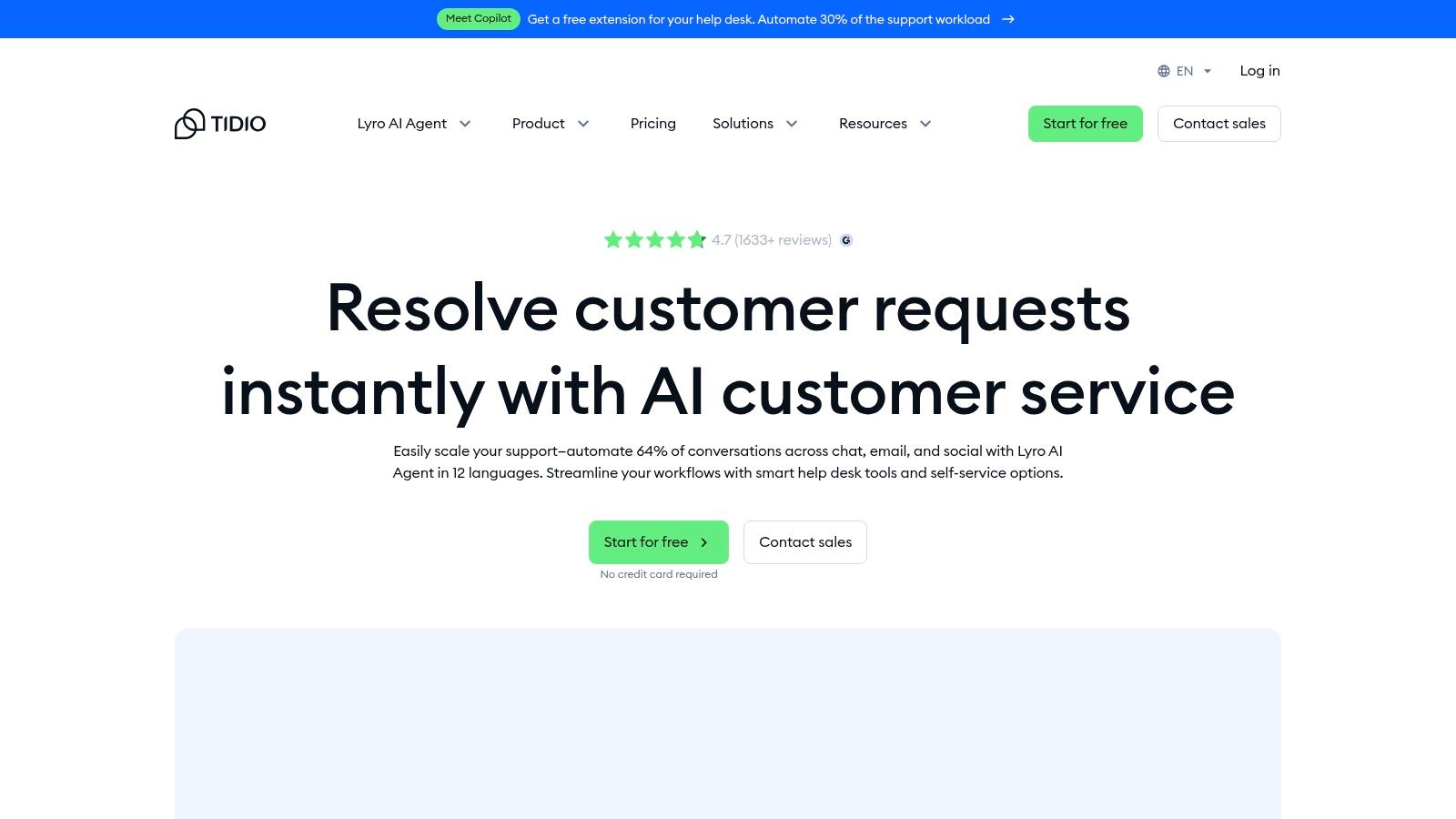
One of Tidio's key features is its AI-powered chatbot equipped with natural language processing (NLP). This allows the chatbot to understand and respond to customer inquiries in a conversational manner, mimicking human interaction. The chatbot can be trained on specific ecommerce scenarios, such as answering product questions, providing order updates, and processing returns. This automation frees up human agents to focus on more complex customer issues and strategic initiatives. The live chat integration with human agent handoff ensures a seamless transition from bot to human when necessary, maintaining a consistent and personalized customer experience. This is particularly useful for handling sensitive inquiries or situations where a human touch is required to build rapport and resolve complex issues.
Tidio also excels in multichannel support, allowing businesses to engage with customers across various platforms, including their website, email, Messenger, and Instagram. This unified communication approach provides a consistent brand experience regardless of the channel customers choose to use. Pre-built ecommerce templates and flows further simplify the setup process, allowing businesses to quickly deploy chatbots and automate common customer service scenarios. The integration with popular ecommerce platforms like Shopify, WooCommerce, and BigCommerce makes implementation even smoother, requiring minimal technical expertise.
From a practical standpoint, Tidio offers several advantages. The easy setup and user-friendly interface make it accessible even for users with limited technical skills. Affordable pricing, starting with a free tier, makes it an attractive option for small and medium-sized businesses. Real-time visitor monitoring and analytics provide valuable insights into customer behavior, allowing businesses to optimize their support strategies and improve conversion rates. For example, businesses can use these analytics to identify common customer pain points and tailor their chatbot responses accordingly.
However, Tidio does have some limitations. Customization options are limited in the lower-tier plans, which may restrict businesses with specific branding or functionality requirements. While Tidio’s AI capabilities are sufficient for many ecommerce applications, they are generally less advanced than those found in enterprise-level solutions. Some advanced features, such as advanced analytics and integrations, require higher-tier subscriptions.
Tidio's pricing plans vary based on the features and the number of chatbot conversations required. The free plan allows for up to 100 unique chatbot conversations per month. Paid plans unlock more features, increased conversation limits, and advanced functionalities. Technical requirements are minimal as Tidio is a cloud-based solution accessible through a web browser. Implementing Tidio is straightforward, typically involving installing a plugin or adding a code snippet to your website. Businesses can further refine their implementation by customizing chatbot flows, integrating with existing CRM systems, and training the chatbot on specific product information and FAQs.
Compared to similar tools like Intercom and Zendesk Chat, Tidio positions itself as a more affordable and ecommerce-focused solution. While Intercom and Zendesk offer more robust enterprise-level features, Tidio’s simplicity and affordability make it a compelling choice for smaller businesses and startups. Overall, Tidio earns its place on this list as a powerful yet accessible AI chatbot for ecommerce, offering a valuable blend of automation and human interaction to enhance customer support and drive business growth. You can explore their offerings and pricing plans further on their website: https://www.tidio.com
3. Intercom
Intercom stands out as a robust, enterprise-grade customer messaging platform equipped with sophisticated AI chatbots perfectly suited for scaling customer support and sales within the ecommerce landscape. It caters specifically to medium to large businesses with complex customer service needs due to its advanced automation features, detailed customer insights, and impressive integration capabilities. This makes it a powerful AI chatbot for ecommerce businesses looking to elevate their customer experience. It's particularly effective for businesses experiencing rapid growth and requiring a solution that can adapt to increasing customer interaction volumes without sacrificing service quality.
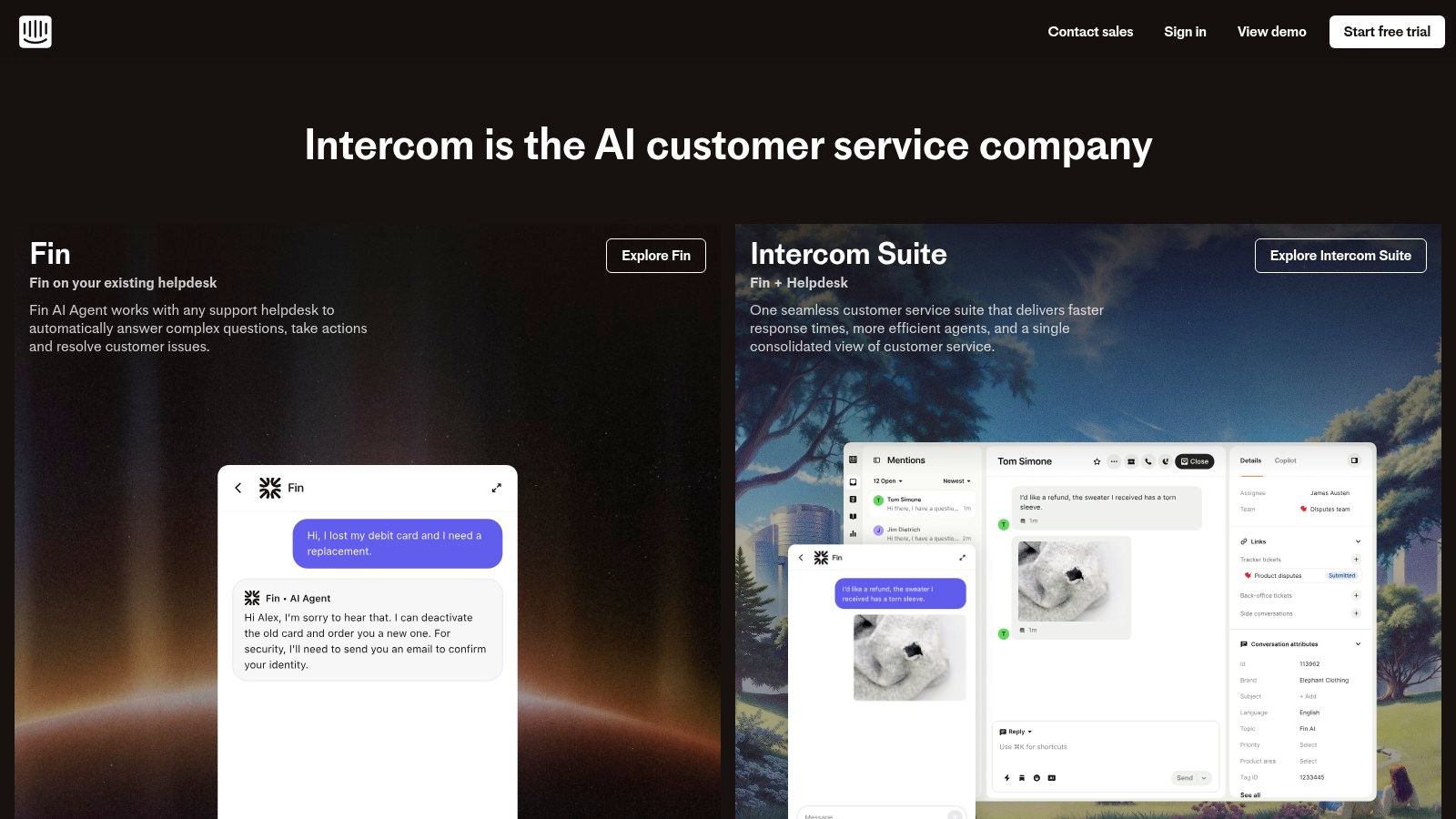
One of Intercom's key strengths lies in its Resolution Bot, an AI-powered tool leveraging machine learning to resolve customer queries automatically. This bot can handle a wide range of common questions, freeing up human agents to focus on more complex issues. For instance, an ecommerce business can train the Resolution Bot to answer questions about order status, shipping information, return policies, and product availability. This 24/7 automated support significantly improves response times and customer satisfaction, especially crucial for businesses operating across different time zones. Furthermore, Intercom offers a visual flow designer for building custom bots tailored to specific business needs. This allows for personalized interactions and the automation of complex workflows, like guiding customers through product selection or troubleshooting technical issues.
Beyond automated responses, Intercom provides advanced customer segmentation and targeting. This allows you to personalize bot interactions based on user behavior, purchase history, or other relevant data. Imagine sending targeted promotions to customers who have abandoned their carts or providing proactive support to high-value clients. This personalized approach can significantly boost conversion rates and customer loyalty. You can learn more about Intercom and its automation capabilities in our related article.
Intercom's comprehensive analytics and reporting dashboard provide valuable insights into bot performance, customer behavior, and overall support efficiency. These data-driven insights enable businesses to continuously optimize their chatbot strategies, identify areas for improvement, and measure the ROI of their customer support efforts. The platform also boasts a robust API and extensive third-party integrations, enabling seamless connectivity with existing CRM systems, marketing automation tools, and other business-critical applications.
While Intercom offers significant advantages for scaling customer support, it's important to consider its limitations. The platform's pricing can be expensive, especially for small businesses or startups with limited budgets. The advanced features come with a steep learning curve, requiring some technical expertise for optimal implementation. For simpler use cases, the platform's extensive functionality can be overwhelming. The setup complexity might necessitate dedicated technical resources, which can be a barrier for smaller teams.
Intercom’s pricing structure is tiered, based on the features and number of "seats" required. While specific pricing isn't publicly available, it generally caters to larger businesses with more substantial budgets. Implementation typically involves integrating Intercom with your website and other systems, configuring the chatbot logic, and training the AI models. This often requires technical expertise, particularly for custom bot development and advanced integrations.
Compared to simpler chatbot solutions, Intercom provides a more comprehensive and powerful platform for managing customer interactions. While solutions like Chatfuel or ManyChat might be suitable for basic chatbot functionality on a smaller scale, Intercom excels in its scalability, advanced automation, and deep integration capabilities, making it ideal for growing ecommerce businesses with complex customer service needs.
For implementing Intercom effectively, begin by clearly defining your customer service goals and identifying the key areas where chatbot automation can add value. Start with simpler use cases and gradually explore more advanced features as your team becomes familiar with the platform. Leverage Intercom's comprehensive documentation and support resources to ensure a smooth implementation process.
4. Drift
Drift positions itself as a conversational marketing and sales platform, leveraging AI-powered chatbots to transform website visitors into qualified leads. Its core strength lies in revenue generation, achieved by seamlessly blending chatbot automation with sales team integration. This makes Drift a particularly compelling choice for B2B ecommerce businesses and retailers dealing with high-ticket items where personalized engagement and lead nurturing are crucial for successful conversions. Instead of focusing primarily on customer support like some other chatbots, Drift prioritizes proactive engagement and lead qualification to drive sales growth. This approach makes it a valuable tool for businesses looking to actively capture and convert leads directly on their website.
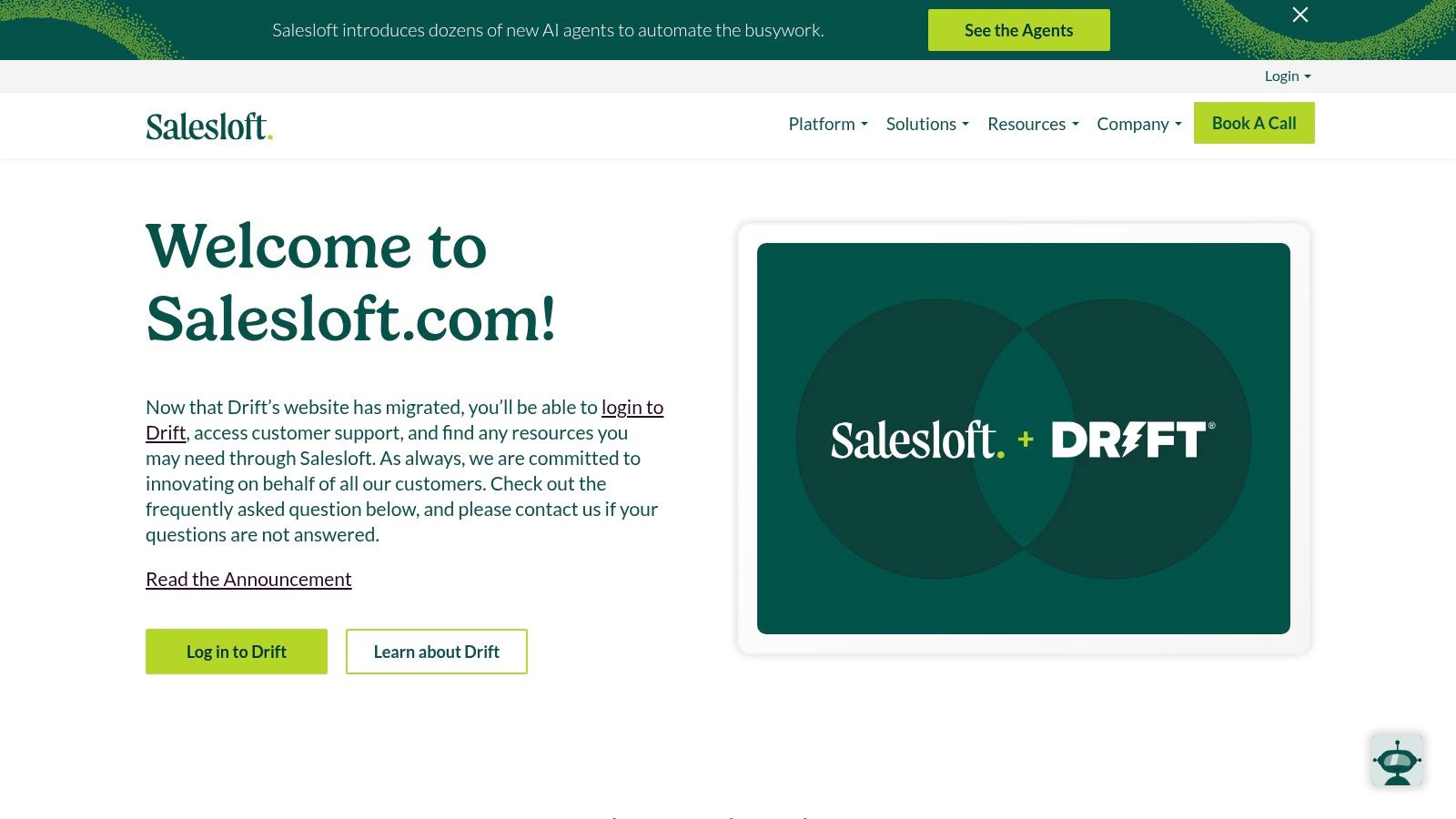
Drift’s AI-powered chatbots are designed to engage visitors in real-time, qualifying them based on pre-defined criteria and routing them to the appropriate sales representative. This personalized approach ensures that leads are handled efficiently, maximizing conversion opportunities. Imagine a potential customer browsing your high-end electronics website. Drift can proactively engage them, understand their needs through conversational AI, and if they express interest in a specific product, instantly connect them with a sales specialist who can provide expert advice and guide them through the purchase process. This real-time engagement and personalized attention can significantly improve conversion rates compared to traditional methods. The platform’s real-time visitor identification and targeting capabilities provide valuable insights into visitor behavior, enabling businesses to tailor their interactions and offer relevant product recommendations.
Drift offers a suite of features designed to optimize the sales process. Conversational AI enables lead qualification and routing, ensuring that potential customers are connected with the right sales representative at the right time. Real-time visitor identification and targeting allow businesses to personalize interactions and offer relevant product recommendations. Meeting scheduling and calendar integration streamline the process of booking appointments with sales representatives, removing friction from the sales cycle. Sales team collaboration tools facilitate efficient communication and information sharing within the sales team. Finally, advanced lead scoring and CRM integration ensure that leads are prioritized and tracked effectively.
Drift’s strengths lie in its powerful lead generation and sales conversion capabilities. The platform’s tight integration with sales tools and CRMs allows for seamless data flow and efficient lead management. Real-time visitor insights and behavioral targeting empower businesses to personalize interactions and optimize their sales strategies. The professional, sales-focused interface is intuitive and easy to use, even for non-technical users.
However, Drift's focus on lead generation comes at the expense of comprehensive customer support features. While it can handle basic support inquiries, businesses looking for a robust customer service solution may find Drift's capabilities limited. Its pricing is higher compared to basic chatbot solutions, making it a more significant investment. The limited customization options for complex customer service scenarios may also be a drawback for businesses with intricate support needs. For simple ecommerce support, Drift might be overkill, and businesses could potentially achieve similar results with more affordable, support-focused chatbot solutions.
While Drift doesn't publicly disclose specific pricing, they offer different tiers based on features and the number of contacts. Businesses can request a demo and receive a customized quote based on their specific needs. Technically, implementing Drift involves adding a JavaScript snippet to your website, similar to other chatbot solutions. Drift offers comprehensive documentation and support to guide users through the setup process. Compared to tools like Intercom or HubSpot, Drift’s laser focus on sales and lead generation makes it a strong contender for B2B ecommerce businesses, while Intercom and HubSpot offer broader functionalities encompassing both marketing and customer support.
For ecommerce businesses prioritizing lead generation and sales conversion, Drift presents a powerful solution. Its AI-powered chatbots, combined with robust sales integrations and real-time visitor insights, offer a valuable tool for driving revenue growth. However, businesses should carefully consider their specific needs and budget before opting for Drift, as its pricing and focus on sales may not be suitable for all ecommerce operations. If your primary need is lead generation and sales enablement, especially for high-value products, then Drift is certainly worth exploring. You can visit their website at https://www.drift.com for more information.
5. Zendesk Chat
Zendesk Chat, formerly known as Zopim, stands out as a robust AI chatbot for ecommerce businesses seeking a comprehensive customer service solution. Unlike standalone chatbot platforms, Zendesk Chat integrates seamlessly into the larger Zendesk ecosystem, offering a unified platform for ticketing, support, and automated conversations. This makes it particularly attractive for businesses that prioritize streamlined workflows and data centralization. If you're looking for a powerful AI chatbot that works in concert with a robust support system, Zendesk Chat is a worthy contender.
For ecommerce businesses, the pressure to provide instant, personalized support is immense. Customers expect quick answers to their questions about order status, shipping information, returns, and product details. Zendesk Chat's AI-powered Answer Bot leverages machine learning to address these common inquiries automatically, freeing up human agents to handle more complex issues. Imagine a customer inquiring about their order status at 3 AM. Instead of waiting for business hours, the Answer Bot can instantly provide the necessary information, enhancing customer satisfaction and reducing response times. This 24/7 availability is a game-changer for online retailers aiming to provide seamless support across different time zones.
Beyond automated responses, Zendesk Chat offers advanced routing and escalation rules. This allows businesses to direct specific inquiries to specialized agents, ensuring that customers receive the most relevant assistance. For example, a technical question about a product can be routed to a product specialist, while a billing inquiry can be directed to the finance team. This streamlined approach reduces resolution times and improves overall customer experience.
One of Zendesk Chat's strengths lies in its omnichannel capabilities. It allows businesses to interact with customers across multiple platforms, including websites, social media channels, and messaging apps. This unified approach ensures a consistent brand experience, regardless of the customer's preferred communication channel. Whether a customer reaches out via live chat on your website or through Facebook Messenger, Zendesk Chat consolidates all interactions into a single platform, simplifying customer management.
For data-driven businesses, Zendesk Chat provides a comprehensive reporting and analytics suite. For those seeking a Chatbase alternative, see Chatbase alternative. Learn more about Zendesk Chat to understand how these analytics can be used to optimize your chatbot's performance. These insights allow businesses to track key metrics such as resolution times, customer satisfaction scores, and agent performance. This data is invaluable for identifying areas for improvement and optimizing chatbot strategies. By analyzing conversation logs and customer feedback, businesses can refine their chatbot's responses and improve its ability to address customer needs.
While Zendesk Chat offers numerous benefits, it's important to consider its potential drawbacks. One key aspect is its reliance on the Zendesk ecosystem. While this integration provides a seamless experience for existing Zendesk users, businesses using other CRM or support systems might find it less convenient. Full functionality is achieved within the Zendesk environment, and integrating with external systems might require custom development or third-party tools.
Another factor to consider is the pricing structure. Zendesk Chat offers various plans, ranging from a free Lite plan to enterprise-grade solutions. While the Lite plan offers basic chatbot functionality, businesses seeking advanced features, such as AI-powered routing and custom integrations, will need to opt for higher-tier plans, which can be expensive for small businesses. However, for medium to large enterprises, the scalability and enterprise-grade features offered by Zendesk Chat justify the investment.
Implementing Zendesk Chat involves integrating the platform with your website and configuring the chatbot's settings. While basic setup is relatively straightforward, configuring advanced features, such as custom integrations and complex routing rules, might require technical expertise. Zendesk provides extensive documentation and support resources, but businesses with limited technical resources might find the initial setup challenging. Consider engaging a Zendesk partner or consultant for assistance with complex configurations.
Overall, Zendesk Chat offers a powerful AI chatbot solution integrated within a comprehensive customer service ecosystem. Its strengths lie in its automation capabilities, omnichannel support, and robust reporting features. While its reliance on the Zendesk ecosystem and pricing might be a concern for some businesses, its scalability and enterprise-grade features make it a compelling choice for medium to large ecommerce businesses seeking a comprehensive customer service solution. If your business already utilizes the Zendesk suite, integrating Zendesk Chat is a natural progression towards enhanced customer support and streamlined workflows.
6. ManyChat
ManyChat is a popular AI chatbot platform specifically designed for ecommerce businesses looking to enhance their social media marketing automation, especially on platforms like Facebook Messenger, Instagram, and SMS. It empowers businesses to leverage these channels for increased customer engagement, streamlined marketing campaigns, and automated sales processes. Its intuitive interface and focus on social commerce make it a valuable tool for growing online businesses. ManyChat excels at creating engaging, interactive experiences within social media platforms, allowing businesses to nurture leads, guide customers through purchases, and provide personalized support. Its strength lies in its ability to bridge the gap between social media presence and ecommerce functionality.
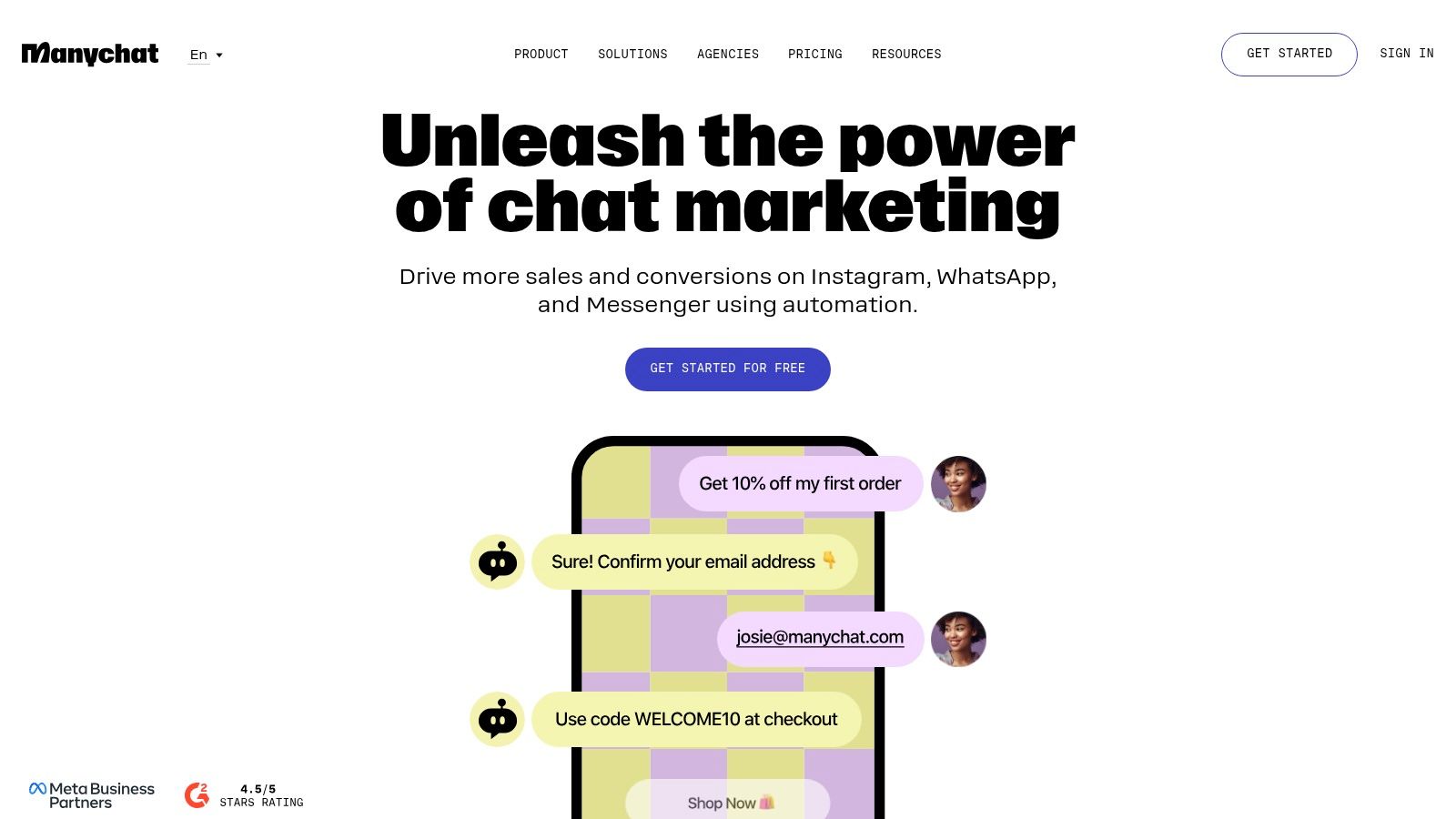
ManyChat's visual, drag-and-drop bot builder simplifies the process of creating complex chatbot flows without requiring coding expertise. This user-friendly interface makes it accessible to businesses of all sizes, from small startups to larger enterprises. The platform supports multiple communication channels, including Messenger, Instagram, SMS, and Email, enabling businesses to reach customers on their preferred platforms. Crucially for ecommerce operations, ManyChat offers seamless integrations with popular platforms like Shopify and WooCommerce. This integration allows for automated order updates, abandoned cart reminders, and product recommendations, directly within the customer's messaging app.
Furthermore, ManyChat facilitates automated marketing sequences and drip campaigns, allowing businesses to nurture leads and drive conversions on autopilot. Its broadcasting and audience segmentation tools enable targeted marketing efforts, ensuring that the right message reaches the right customer at the right time. For example, businesses can segment customers based on purchase history, demographics, or engagement level, and tailor messages accordingly. This level of personalization can significantly improve marketing effectiveness.
Pricing and Technical Requirements:
ManyChat offers a generous free tier, suitable for businesses just starting out. Paid plans offer more advanced features, such as increased subscriber limits, unlimited custom fields, and access to email marketing. Pricing scales based on the number of contacts, making it affordable for growing businesses. As for technical requirements, ManyChat is a cloud-based platform, so no special software installation is required. A stable internet connection and a ManyChat account are all that’s needed to get started.
Comparison with Similar Tools:
Compared to other AI chatbots like Chatfuel or MobileMonkey, ManyChat stands out with its strong focus on social commerce and its ease of use. While some platforms prioritize customer support, ManyChat excels at leveraging social media for marketing and sales. Its integrations with ecommerce platforms are also a significant advantage for online retailers. However, it's worth noting that ManyChat's AI capabilities are less sophisticated than some enterprise-level solutions.
Implementation and Setup Tips:
Setting up ManyChat is relatively straightforward. Begin by connecting your Facebook Business Page and choosing a template or starting from scratch. Utilize the drag-and-drop builder to create your chatbot flows, incorporating various elements like text, images, buttons, and user input fields. Integrate with your ecommerce platform to automate order updates and product recommendations. Finally, test your chatbot thoroughly before launching it to ensure a seamless customer experience.
Pros:
- Excellent for social media marketing automation.
- User-friendly visual bot builder.
- Strong ecommerce platform integrations.
- Affordable pricing with a generous free tier.
Cons:
- Primarily focused on marketing rather than customer support.
- Limited AI capabilities compared to enterprise solutions.
- Dependent on social media platforms' policies and changes.
- Less suitable for complex customer service scenarios.
Website: https://manychat.com
ManyChat deserves a place on this list due to its specialized focus on social commerce and its user-friendly approach. It provides a powerful yet accessible platform for ecommerce businesses to leverage the potential of social media for marketing, sales, and customer engagement. While it may not be the ideal solution for complex customer support scenarios, its strengths lie in automating marketing flows, driving sales conversions, and creating engaging social media experiences. For businesses looking to amplify their social commerce efforts, ManyChat is a valuable tool.
7. ChatBot.com
ChatBot.com stands out as a robust, standalone AI chatbot platform specifically designed for e-commerce businesses. Unlike some solutions that require integration with existing live chat software, ChatBot.com offers a complete, independent system, making it a compelling choice for businesses seeking a dedicated chatbot solution with extensive customization and branding control. This comprehensive platform empowers businesses to automate customer interactions, streamline operations, and enhance the overall customer experience without relying on third-party tools. Its focus on e-commerce makes it particularly well-suited for online retailers looking to leverage AI for improved customer service and increased sales. Learn more about ChatBot.com from this insightful article.
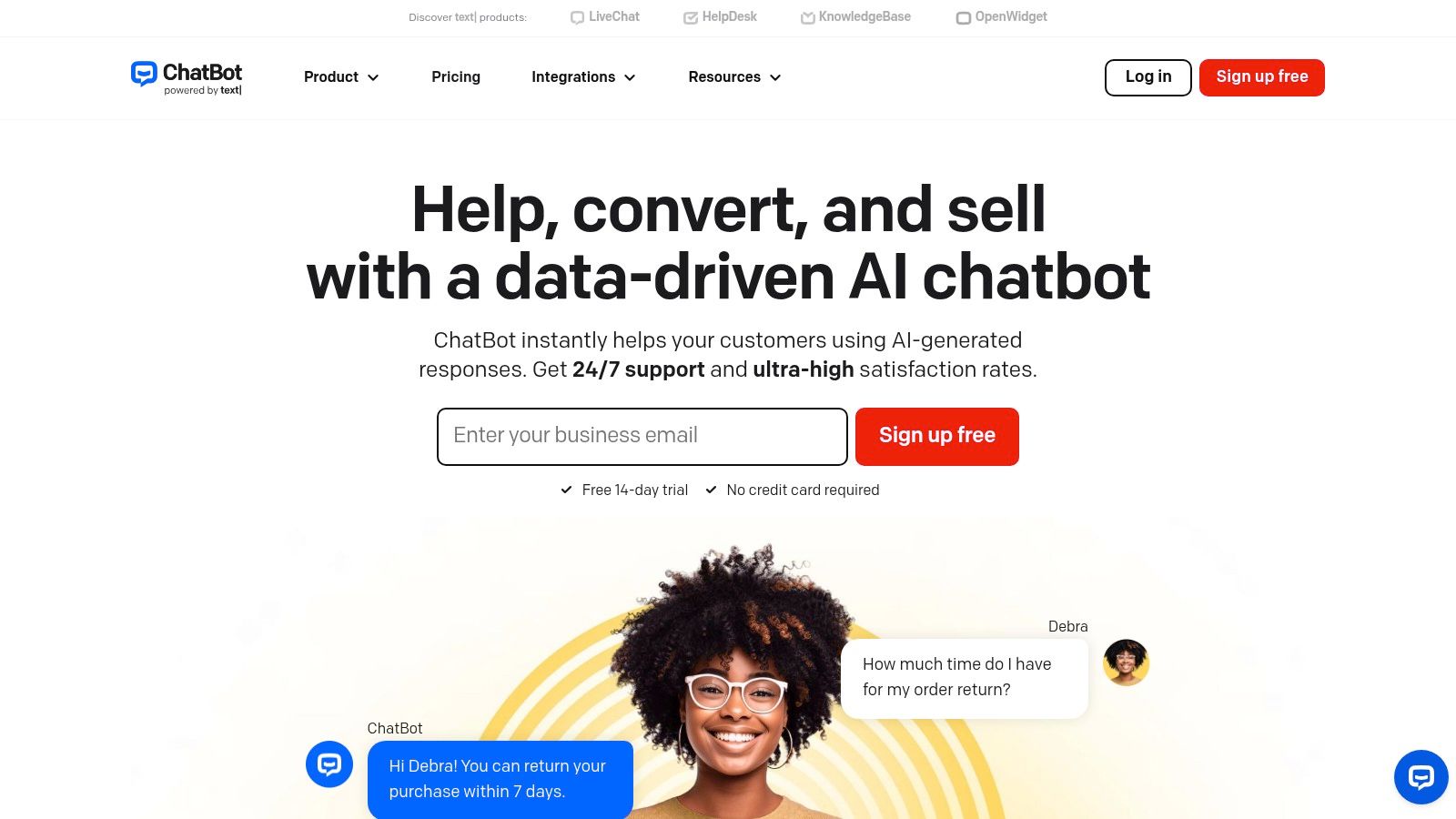
One of the most significant advantages of ChatBot.com is its visual bot builder. This drag-and-drop interface simplifies the process of creating complex conversational flows, even for users with limited technical expertise. Pre-built templates for common e-commerce scenarios, like order tracking and product recommendations, further accelerate the setup process. Furthermore, the platform’s AI and Natural Language Processing (NLP) capabilities enable chatbots to understand and respond to customer inquiries in a natural and conversational manner, improving customer engagement and satisfaction.
This ai chatbot for ecommerce boasts multiple integration options, seamlessly connecting with popular e-commerce platforms like Shopify, WooCommerce, and BigCommerce. This allows businesses to synchronize customer data, personalize interactions, and automate tasks such as order processing and shipping updates. The platform also provides robust analytics and conversation insights, allowing businesses to track chatbot performance, identify areas for improvement, and gain valuable insights into customer behavior. This data-driven approach empowers businesses to optimize their chatbot strategies and maximize their ROI.
ChatBot.com also shines with its white-label and custom branding options. Businesses can tailor the chatbot's appearance to match their brand identity, creating a seamless and consistent customer experience. This level of customization is particularly appealing for businesses that prioritize brand consistency and want to maintain full control over their customer-facing interactions. This dedication to branding reinforces the standalone nature of the platform, allowing businesses to fully own the customer service experience.
While ChatBot.com offers numerous advantages, it's essential to consider its limitations. One notable drawback is the lack of built-in live chat functionality. While chatbots can handle many routine inquiries, some complex issues may require human intervention. Businesses needing both chatbot automation and live chat support might need to integrate with a separate live chat platform, adding complexity and potentially increasing costs. Another area where ChatBot.com falls short compared to enterprise-level platforms is the depth of its AI capabilities. While it offers solid NLP and conversational AI, it may not provide the same level of advanced AI features, such as sentiment analysis or predictive modeling, found in more sophisticated (and often more expensive) solutions.
For small to medium-sized businesses (SMBs) and even larger enterprises seeking a dedicated, customizable ai chatbot for ecommerce, ChatBot.com offers a compelling balance of features and affordability. While pricing details aren't readily available on their website, the platform generally positions itself as a cost-effective solution for businesses looking to implement AI-powered customer service. Technical requirements are minimal, primarily involving account creation and integration with your chosen e-commerce platform. The platform’s intuitive interface and visual bot builder minimize the technical expertise required for setup and ongoing management.
Compared to similar tools like ManyChat or Tidio, ChatBot.com distinguishes itself with its standalone approach and focus on custom branding. ManyChat, for example, is primarily integrated with Facebook Messenger, while Tidio combines live chat with chatbot functionality. ChatBot.com’s independent nature provides greater flexibility and control, especially for businesses that prefer not to be tied to a specific messaging platform or require a more bespoke solution. This makes ChatBot.com a strong contender for businesses prioritizing customization and a dedicated chatbot experience.
In summary, ChatBot.com offers a valuable tool for businesses looking to implement an AI-powered chatbot for e-commerce. Its standalone nature, robust feature set, and focus on customization make it a compelling choice for a wide range of businesses, particularly SMBs and those with specific branding requirements. While it may lack the advanced AI capabilities of some enterprise solutions, its balance of functionality and affordability makes it a strong contender in the ai chatbot for ecommerce landscape.
8. Ada
Ada stands out as a robust AI chatbot platform specifically designed for enterprise ecommerce businesses. Unlike simpler chatbot solutions, Ada focuses on handling complex customer inquiries with its advanced natural language understanding and sophisticated conversational AI. This makes it ideal for businesses needing high levels of automation without sacrificing the quality of customer interaction. Its powerful AI engine can discern nuances in language, interpret complex requests, and provide personalized responses, resulting in higher resolution rates and improved customer satisfaction. This positions Ada as a strong contender for businesses with large volumes of complex customer interactions or those operating in a global marketplace demanding multilingual support.
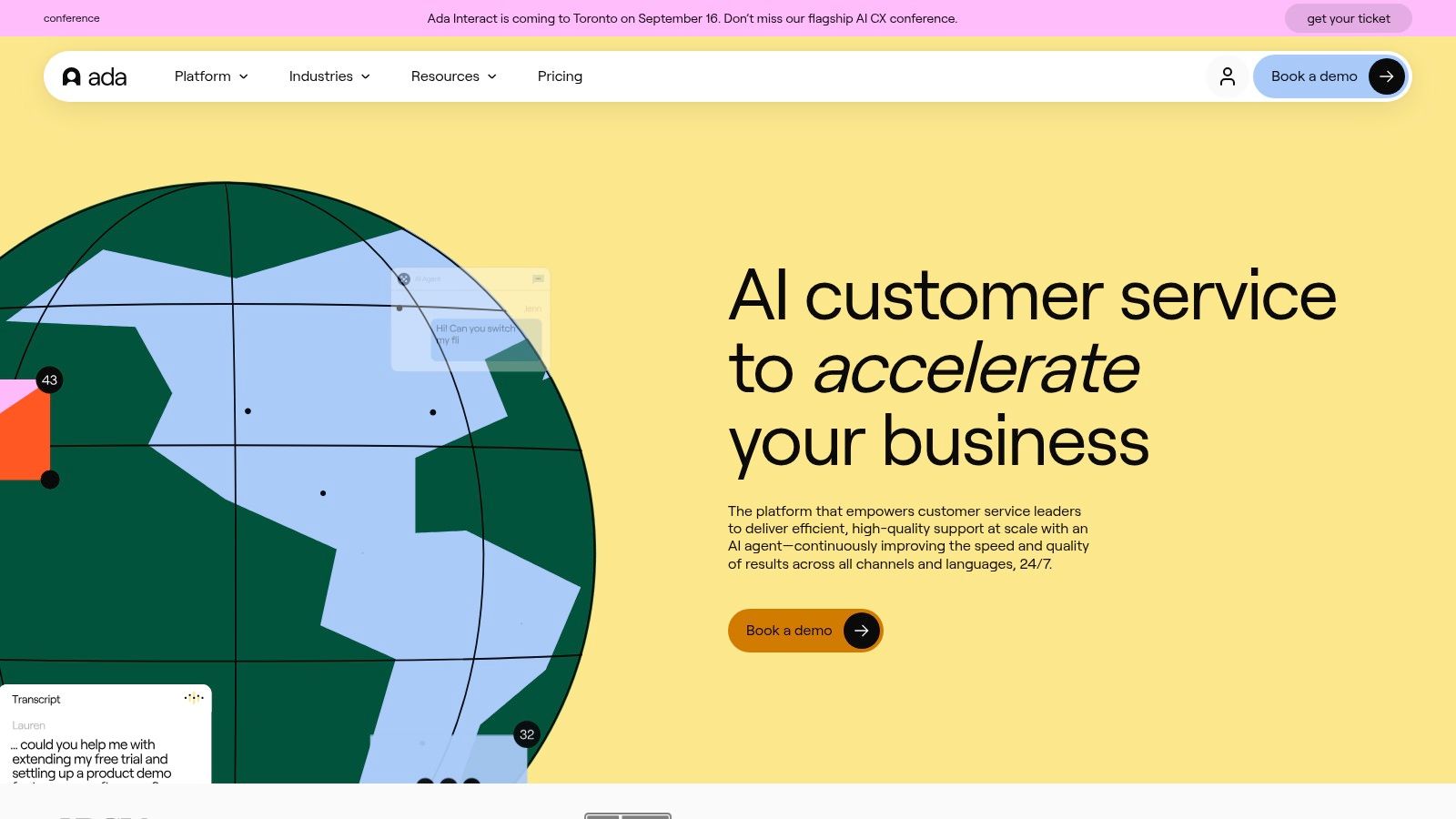
For ecommerce businesses, Ada's capabilities translate into several practical applications. Imagine a customer inquiring about a product's compatibility with another item they purchased previously. Ada can access the customer's purchase history, understand the technical specifications of both products, and provide a definitive answer, potentially preventing a return or exchange. Similarly, Ada excels at handling pre-sales questions, guiding customers through the purchase process, and proactively addressing potential issues like shipping delays. This proactive approach minimizes customer frustration and frees up human agents to handle more complex or sensitive inquiries. Moreover, for global ecommerce businesses, Ada’s multilingual support ensures consistent and high-quality customer experiences across different markets.
While many AI chatbots offer basic order tracking and FAQ functionalities, Ada goes further by integrating with backend systems such as CRM and inventory management. This allows the chatbot to provide real-time updates on order status, process returns and exchanges, and even offer personalized product recommendations based on past purchases and browsing behavior. This level of integration streamlines customer service operations and delivers a seamless customer experience. Furthermore, Ada’s advanced analytics provide valuable insights into customer interactions, identifying trending issues, and highlighting areas for improvement in product offerings or customer service processes.
Compared to other tools like Intercom or Zendesk which offer chatbots alongside other customer support features, Ada specializes solely in advanced conversational AI. This focus allows Ada to deliver a more sophisticated and robust chatbot experience, particularly for enterprise-level needs. While platforms like ManyChat excel in marketing automation, Ada’s strength lies in customer service automation, offering superior natural language understanding and complex conversation handling. This makes Ada a powerful solution for businesses prioritizing resolving complex customer queries and automating a high percentage of their support interactions.
Implementing Ada requires some technical expertise, especially for advanced integrations and complex conversational flows. While the platform offers a no-code bot builder for basic setups, harnessing its full potential requires a dedicated team or agency partner experienced with conversational AI design and integration. This longer implementation time is a trade-off for the advanced capabilities Ada offers. Furthermore, Ada's premium pricing structure, while undisclosed publicly, caters primarily to enterprise businesses with significant customer service volumes. This makes it less suitable for smaller businesses with simpler needs.
For those considering Ada, it’s essential to thoroughly assess their customer service requirements and budget. While Ada offers a highly advanced AI-powered chatbot solution, its complexity and pricing make it most suitable for large businesses seeking to automate complex customer interactions at scale. If your business demands sophisticated conversational AI, multilingual support, and enterprise-grade security, then Ada (https://ada.cx) deserves serious consideration. However, if your needs are simpler and your budget is limited, exploring alternative solutions might be more prudent.
AI Chatbot Features Comparison for E-commerce (including Grok 3)
| Platform | Core Features & Integrations | User Experience & Quality ★★★★☆ | Value Proposition 💰 | Target Audience 👥 | Unique Selling Points ✨ |
|---|---|---|---|---|---|
| 🏆 FlowGent AI | No-code, omnichannel (WhatsApp, Slack, Instagram, web), CRM & ticketing integrations, 95+ languages | Human-quality 24/7 support, real-time logs & analytics | Proven ROI: up to 70% cost cut, 35% more leads, 40% retention | Small ecomm, agencies, enterprises | Multilingual, deep workflow customization, global scale |
| Tidio | AI chatbot, live chat, ecommerce platform integrations | Easy setup, user-friendly interface | Affordable, free tier available | Ecommerce businesses | Pre-built ecommerce templates, real-time visitor insights |
| Intercom | Advanced AI bots, custom flow builder, analytics, API | Sophisticated automation, strong data management | Premium pricing, scalable for growth | Medium to large ecommerce | Enterprise-grade AI, extensive integrations |
| Drift | Conversational AI for lead qualification, sales integrations | Professional sales-focused interface, real-time targeting | Higher pricing, lead-gen focused | B2B ecommerce, high-ticket retailers | Lead scoring, sales team collaboration tools |
| Zendesk Chat | AI Answer Bot, tight Zendesk ticketing integration, omnichannel | Enterprise features, robust reporting | Expensive for small biz, full Zendesk needed | Enterprises needing full support suite | Seamless ticket escalation, analytics |
| ManyChat | Visual bot builder, multi-platform (Messenger, SMS, Instagram) | User-friendly, social media marketing focus | Affordable, generous free tier | Ecommerce social media marketers | Marketing automation, broadcast campaigns |
| ChatBot.com | Standalone AI chatbot, visual templates, ecommerce integrations | Good customization, no live chat agents | Balanced pricing, dedicated chatbot solution | Ecommerce needing standalone bots | White-label branding, NLP-enabled conversations |
| Ada | Advanced AI, no-code bot creation, multilingual | High resolution rates, enterprise security | Premium, suited for large enterprises | Large ecommerce enterprises | Complex query handling, global language support |
Choosing the Right AI Chatbot for Your E-commerce Business
Finding the perfect AI chatbot for ecommerce can feel overwhelming with so many options available. This listicle has explored leading solutions like FlowGent AI, Tidio, Intercom, Drift, Zendesk Chat, ManyChat, ChatBot.com, and Ada, each offering unique features and capabilities. The key takeaway is that the "best" chatbot depends entirely on your specific needs. Prioritize factors like platform compatibility (where you sell your products), language support, the typical complexity of your customer interactions, and the level of customization you require. Small businesses might prioritize affordability and ease of use, while larger enterprises may need robust integrations and multilingual support. If you’re feeling a bit lost navigating the world of AI chatbots, Voicetta offers a helpful resource: their Complete guide to AI chatbots provides a comprehensive overview to help you make informed decisions. This guide, titled AI Chatbot Success: Complete Guide for Smart Businesses, dives deeper into the nuances of chatbot selection and implementation.
Successfully implementing an AI chatbot involves more than just choosing a tool. Consider your customer journey, identify key pain points where a chatbot can intervene, and design conversational flows that feel natural and helpful. Proper training and ongoing optimization are also crucial for maximizing your chatbot's effectiveness and ensuring it delivers a positive customer experience. By carefully considering these factors, you can leverage the power of AI chatbots to streamline customer support, automate tasks, and ultimately, drive sales growth in 2025 and beyond.
Ready to experience the future of e-commerce customer service? FlowGent AI offers cutting-edge AI chatbot solutions specifically designed for e-commerce businesses, helping you automate conversations, personalize interactions, and boost conversions. Explore FlowGent AI today and discover how it can transform your online store.
